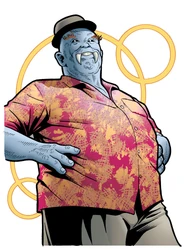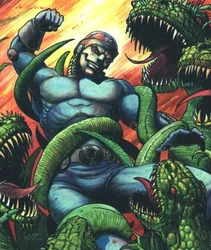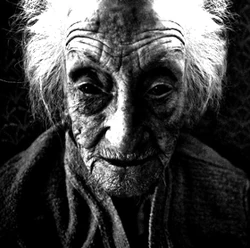The book begin in 1979 where we found out what everybody's favorite tantric magician, Fortunato, has been up to since the first book in a story called "Pennies from Hell", written by Lewis Shiner. The answer to that question turns out to be continuing his vendetta against the cult he antagonized in Book I which are revealed to be a branch of the Egyptian Masons.
This story introduces a running theme of Fortunato's character arc: the fact that his actions tend to have unintended consequences to the people closest to him. The realization of this clashes with the character's fundamentally selfish attitude towards life, driving much of his internal conflict going forward. That being said, the sexual nature of Fortunato's powers comes off as trying to hard to shock and ends up just being silly. Reading the scene at the end of "Pennies from Hell", where Fortunato (apparently) destroys the Masons, the details of which I will mercifully spare you, prompted a snicker when I first read the book as a teenager and time has not made it any less silly.
 The book jumps ahead to 1985 to two interstitial stories, "Jube" (uncredited) and "Unto the Sixth Generation" by Walter John Williams. Starting with this book, Wild Cards novels contained interstitial stories divided into multiple chapters throughout the book and advancing the book's overarching plot. These stories contrast with individual stories which takes up a single chapter.
The book jumps ahead to 1985 to two interstitial stories, "Jube" (uncredited) and "Unto the Sixth Generation" by Walter John Williams. Starting with this book, Wild Cards novels contained interstitial stories divided into multiple chapters throughout the book and advancing the book's overarching plot. These stories contrast with individual stories which takes up a single chapter.
In this case, the two stories share an inciting incident: A dying alien arrives on Earth with an experimental teleportation device with a warning of an oncoming invasion by a race of world devouring aliens called the Swarm. "Jube" tells the story one of the alien's associates, Jube the Walrus, a newsboy who appears to be a deformed joker, but is in fact an alien himself: an agent planted by a group of space trader know as the Network to spy on the Wild Cards. Jube spends most of the book trying to build a device to call the Network to summon help to fight off the Swarm.
 "Unto the Sixth Generation" introduces a new hero, the android Modular Man, created by Dr. Maxim Travnicek, an ace whose ability make him a gifted inventor. Being a self-obsessed misanthrope, Travnicek has designs on fame and programs Modular Man to fight crime as part of a plan to get rich by selling androids to the military. Quickly becoming a celebrity, Modular Man is accepted into the ace community, and as a result gets a front-row seat for the Swarm invasion.
"Unto the Sixth Generation" introduces a new hero, the android Modular Man, created by Dr. Maxim Travnicek, an ace whose ability make him a gifted inventor. Being a self-obsessed misanthrope, Travnicek has designs on fame and programs Modular Man to fight crime as part of a plan to get rich by selling androids to the military. Quickly becoming a celebrity, Modular Man is accepted into the ace community, and as a result gets a front-row seat for the Swarm invasion.
Both Jube and Modular Man were good choices for protagonists as they are both likable characters. In Jube's case, the idea of an alien passing as a disfigured human is a clever one. Furthermore, he is the rare Wild Cards character who simply has a good heart. He cares about other people and the character's ernest desire to save Earth is endearing even if his story ultimately comes to a rather cynical conclusion.
Modular Man is another character who is basically a good person. Unlike android comic-book heroes, like the Vision or the Red Tornado, who Modular Man owes a clear debt to, fitting in with humanity proves to be the easy part. Modular Man loves life and embraces it fully. Like many characters in the series, Modular Man is a womanizer who likes alcohol. Unlike the other characters, this doesn't come of as much as a character flaw but rather as a side effect of the character's sheer joy d'vivre. Its hard to hate some one who enjoys life so much. The character's real conflict comes from the dawning realization that he is essentially enslaved by his creator, Dr. Travnicek.
Modular Man's story, "Unto the Sixth Generation" is the story that focuses more on super-hero action with several genuinely suspenseful fight scenes. It also has the honor of introducing the story's major human villain, The Astronomer, the leader of the Egyptian Masons who survived Fortunato's assault in the first story and has his own reasons for wanting the Swarm to invade. He's also an old man in a wheel chair so how terrifying could he possibly be?
-- Oh. That terrifying. Despite his age, the Astronomer is a particularly nasty villain. His ace ability grants him incredible psychic powers which he charges by killing people, which he does in several sequences that are not for the faint of heart. He is unsettling because, while he is clearly a psychopath, he is also a master planner. His evil plan is genuinely clever, which give the story a villain that seems like a genuine threat, no easy feet for a book with so many powerful heroes.
In part two, we'll explore the individual stories and catch up with Wild Cards mainstays like Dr. Tachyon and the Turtle.
 The book jumps ahead to 1985 to two interstitial stories, "Jube" (uncredited) and "Unto the Sixth Generation" by Walter John Williams. Starting with this book, Wild Cards novels contained interstitial stories divided into multiple chapters throughout the book and advancing the book's overarching plot. These stories contrast with individual stories which takes up a single chapter.
The book jumps ahead to 1985 to two interstitial stories, "Jube" (uncredited) and "Unto the Sixth Generation" by Walter John Williams. Starting with this book, Wild Cards novels contained interstitial stories divided into multiple chapters throughout the book and advancing the book's overarching plot. These stories contrast with individual stories which takes up a single chapter.In this case, the two stories share an inciting incident: A dying alien arrives on Earth with an experimental teleportation device with a warning of an oncoming invasion by a race of world devouring aliens called the Swarm. "Jube" tells the story one of the alien's associates, Jube the Walrus, a newsboy who appears to be a deformed joker, but is in fact an alien himself: an agent planted by a group of space trader know as the Network to spy on the Wild Cards. Jube spends most of the book trying to build a device to call the Network to summon help to fight off the Swarm.
 "Unto the Sixth Generation" introduces a new hero, the android Modular Man, created by Dr. Maxim Travnicek, an ace whose ability make him a gifted inventor. Being a self-obsessed misanthrope, Travnicek has designs on fame and programs Modular Man to fight crime as part of a plan to get rich by selling androids to the military. Quickly becoming a celebrity, Modular Man is accepted into the ace community, and as a result gets a front-row seat for the Swarm invasion.
"Unto the Sixth Generation" introduces a new hero, the android Modular Man, created by Dr. Maxim Travnicek, an ace whose ability make him a gifted inventor. Being a self-obsessed misanthrope, Travnicek has designs on fame and programs Modular Man to fight crime as part of a plan to get rich by selling androids to the military. Quickly becoming a celebrity, Modular Man is accepted into the ace community, and as a result gets a front-row seat for the Swarm invasion.Both Jube and Modular Man were good choices for protagonists as they are both likable characters. In Jube's case, the idea of an alien passing as a disfigured human is a clever one. Furthermore, he is the rare Wild Cards character who simply has a good heart. He cares about other people and the character's ernest desire to save Earth is endearing even if his story ultimately comes to a rather cynical conclusion.
Modular Man is another character who is basically a good person. Unlike android comic-book heroes, like the Vision or the Red Tornado, who Modular Man owes a clear debt to, fitting in with humanity proves to be the easy part. Modular Man loves life and embraces it fully. Like many characters in the series, Modular Man is a womanizer who likes alcohol. Unlike the other characters, this doesn't come of as much as a character flaw but rather as a side effect of the character's sheer joy d'vivre. Its hard to hate some one who enjoys life so much. The character's real conflict comes from the dawning realization that he is essentially enslaved by his creator, Dr. Travnicek.
Modular Man's story, "Unto the Sixth Generation" is the story that focuses more on super-hero action with several genuinely suspenseful fight scenes. It also has the honor of introducing the story's major human villain, The Astronomer, the leader of the Egyptian Masons who survived Fortunato's assault in the first story and has his own reasons for wanting the Swarm to invade. He's also an old man in a wheel chair so how terrifying could he possibly be?
-- Oh. That terrifying. Despite his age, the Astronomer is a particularly nasty villain. His ace ability grants him incredible psychic powers which he charges by killing people, which he does in several sequences that are not for the faint of heart. He is unsettling because, while he is clearly a psychopath, he is also a master planner. His evil plan is genuinely clever, which give the story a villain that seems like a genuine threat, no easy feet for a book with so many powerful heroes.
In part two, we'll explore the individual stories and catch up with Wild Cards mainstays like Dr. Tachyon and the Turtle.

No comments:
Post a Comment